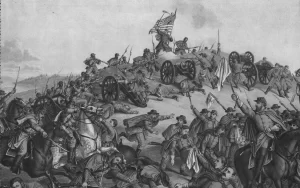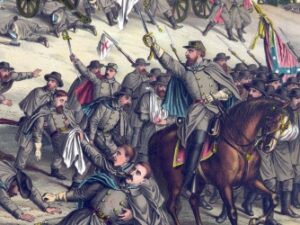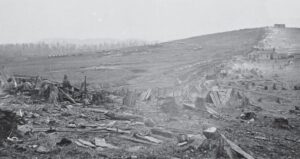 These days, it’s strange to think of battles being fought on US soil. We have begun to believe that a war, at least can’t take place on our soil anymore, because we have so many early warning systems to tell of any incoming missiles or planes, but that wasn’t always the case. The Civil War was one of the biggest wars fought on US soil, and strangely, we were fighting ourselves. Civil Wars are among the worst kinds, because there is so much anger and unrest. We have had a number of wars fought here, including the Civil War, which was clearly one of the worst on our soil. Wars are unpredictable, and the length of battles vary, with some long and drawn out, and some were just one or two days. The Battle of Nashville, Tennessee, fell into the latter category, fought on December 15 and 16, 1864, between the Confederate Army of Tennessee under Lieutenant General John Bell Hood and the Union Army of the Cumberland under Major General George H Thomas. The Battle of Nashville was part of the Franklin-Nashville Campaign.
These days, it’s strange to think of battles being fought on US soil. We have begun to believe that a war, at least can’t take place on our soil anymore, because we have so many early warning systems to tell of any incoming missiles or planes, but that wasn’t always the case. The Civil War was one of the biggest wars fought on US soil, and strangely, we were fighting ourselves. Civil Wars are among the worst kinds, because there is so much anger and unrest. We have had a number of wars fought here, including the Civil War, which was clearly one of the worst on our soil. Wars are unpredictable, and the length of battles vary, with some long and drawn out, and some were just one or two days. The Battle of Nashville, Tennessee, fell into the latter category, fought on December 15 and 16, 1864, between the Confederate Army of Tennessee under Lieutenant General John Bell Hood and the Union Army of the Cumberland under Major General George H Thomas. The Battle of Nashville was part of the Franklin-Nashville Campaign.
As far as battles go, the length does not necessarily have anything to do with the size of the victory. The Battle of Nashville was short, but it was also one of the largest victories achieved by the Union Army during the Civil War. Hood’s army was effectively destroyed when Thomas attacked and routed it as a capable fighting force. Amazingly, the Battle of Nashville was considered the only perfectly fought battle of the war, because it unfolded in “greater accordance with the victor’s battle plan” than any other clash of the war. Nashville, at that time was the second-most fortified city in America…second only to Washington DC, making the victory there an even greater one.
Although Thomas’s forces were much stronger than Hood’s army, Hood’s army was still a force to be reconned  with and could not be ignored. Hood’s army had taken a severe beating at Franklin, but it nevertheless presented a threat by its mere presence and ability to maneuver. Therefore, Thomas knew he had to attack. He prepared cautiously, because he knew that Hood was not a complete pushover, and therefore, a poorly executed plan of attack could have ended in disaster. Thomas was concerned about his cavalry corps, because they were commanded by the energetic young Brigadier General James H Wilson, but they were poorly armed and mounted, and he did not want to proceed to a decisive battle without effective protection of his flanks. This was particularly important, since Wilson would be facing the horsemen of the formidable Forrest. Still, refitting the Union cavalry took time, so he had to be patient.
with and could not be ignored. Hood’s army had taken a severe beating at Franklin, but it nevertheless presented a threat by its mere presence and ability to maneuver. Therefore, Thomas knew he had to attack. He prepared cautiously, because he knew that Hood was not a complete pushover, and therefore, a poorly executed plan of attack could have ended in disaster. Thomas was concerned about his cavalry corps, because they were commanded by the energetic young Brigadier General James H Wilson, but they were poorly armed and mounted, and he did not want to proceed to a decisive battle without effective protection of his flanks. This was particularly important, since Wilson would be facing the horsemen of the formidable Forrest. Still, refitting the Union cavalry took time, so he had to be patient.
While Thomas knew what he was doing, Washington was not so patient, and in fact, they were fuming at the seeming procrastination. It was then that Sherman proposed his March to the Sea. Ulysses S Grant and Henry Halleck objected to it, because they thought that Hood would use the opportunity to invade Tennessee. In response, Sherman airily indicated that this was exactly what he wanted and that if Hood “continues to march North, all the way to Ohio, I will supply him with rations.” It sounded like a perfect plan, however, when the ever-confident Sherman disappeared into the heart of Georgia, Grant once again became concerned about an invasion of Kentucky or Ohio. Grant later said of the situation, “If I had been Hood, I would have gone to Louisville and on north until I came to Chicago.” His concern doubtless reflected Abraham Lincoln’s concern. Lincoln had little patience for slow generals and remarked of the situation, “This seems like the McClellan and Rosecrans strategy of do nothing and let the rebels raid the country.” Still, the plan to attack Nashville seems to have been the right move.
Washington continued to pressure Hood to push forward. Then on December 8, a bitter ice storm struck Nashville, stalling the plan again. While unusual for  Nashville, the sub-freezing weather continued through December 12. Hood explained that to Grant, but when Thomas had still not moved by December 13, Grant directed that Major General John A Logan proceed to Nashville and assume command if Thomas had not yet initiated operations, by the time Logan arrived. Logan made it as far as Louisville by December 15, but on that day the Battle of Nashville had finally begun. A still impatient Grant left Petersburg on December 14, to take personal command. Apparently, he didn’t trust Logan much either. Once the battle began, Grant returned to Washington…a good thing, since three commanding officers might have been a bit awkward.
Nashville, the sub-freezing weather continued through December 12. Hood explained that to Grant, but when Thomas had still not moved by December 13, Grant directed that Major General John A Logan proceed to Nashville and assume command if Thomas had not yet initiated operations, by the time Logan arrived. Logan made it as far as Louisville by December 15, but on that day the Battle of Nashville had finally begun. A still impatient Grant left Petersburg on December 14, to take personal command. Apparently, he didn’t trust Logan much either. Once the battle began, Grant returned to Washington…a good thing, since three commanding officers might have been a bit awkward.


Leave a Reply